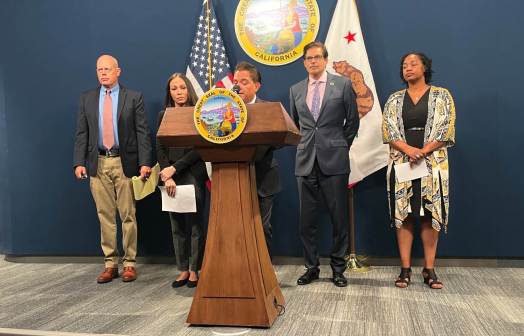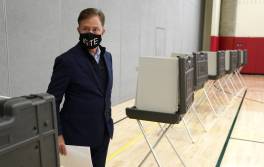With AI afoot, state election officials ask federal lawmakers for more funding

State and local election officials on Tuesday testified before the Senate Rules Committee that AI-generated deepfakes present a growing threat to election administration and security.
With a focus on election integrity during the 2024 election cycle, state and local election officials urged lawmakers to pass legislation that would address challenges posed by artificial intelligence and endangered election workers and voters.
Since 2019, all 50 states have introduced legislation to regulate deepfakes in elections. Legislation passed in 15 states and has already been enacted in seven others, according to Public Citizen, a consumer advocacy organization.
Election officials also addressed challenges posed by artificial intelligence such as misinformation and disinformation, in addition to voter mobilization efforts, voting rights, and concerns posed by foreign adversaries to interfere in the upcoming U.S. elections.
Michigan Secretary of State Jocelyn Benson urged lawmakers to pass the Preparing Election Administrators for AI Act, introduced by Sen. Amy Klobuchar, D-Minn., who chairs the committee, and Sen. Susan Collins, R-Maine, who vice chairs the Senate Appropriations Committee.
“Our job as election administrators increasingly forces us to endure harassment, false and malicious attacks on our character and threats of violence, all because of lies about our work and our integrity,” Benson said in her opening statement. “But now we need you to do your part. As US Senators you can protect every voter in this country from the harmful effects of deceptive AI-generated content.”
The bipartisan bill would require the Election Assistance Commission, a resource agency for election administrators, and the National Institute of Standards and Technology, to develop voluntary guidelines for election offices to address uses and risks of AI in election administration, cybersecurity, information-sharing about elections and the spread of election-related disinformation.
Benson said that the realities of AI underscore the need for federal investment in U.S. elections, including legislation and funding. She also advocated for the Department of Homeland Security and the Cybersecurity and Infrastructure Security Agency to be more aggressive in identifying and combating AI-generated threats.
“AI introduces a level of speed, scale and sophistication that is difficult for under-resourced state agencies to handle on our own,” she said. “Federal funds help us to support and bolster our state’s cybersecurity infrastructure and do more voter education to address this evolving threat.”
‘Every state’ can do this
Alabama Secretary of State Wes Allen during the hearing pointed to his state’s creation of AVID, or the Alabama Voter Identification Database, which he said will be used to maintain voter registration rolls. AVID allows his office to cross-check state voter files with a national death index maintained by the Social Security Administration and remove individuals who die out of state.
“Every state should be able to do this, but excessive federal regulations make it more difficult than it should be for states to access this important information,” Allen said. “You as members of the United States Senate can remove these obstacles and make this information immediately available to every secretary of state in the country.”
Though Allen received approval from the Alabama legislature to remove deceased voters from their files, the National Voter Registration Act of 1993 requires states to wait four years to make such removals.
Allen encouraged states to shorten the four-year waiting period, saying proper voter file maintenance is essential to preserving confidence in elections.
“The four-year waiting period allows an individual to remain in a voter file in a state in which they no longer live for several elections, including a presidential election, a U.S. Senate election, a gubernatorial election, congressional elections and numerous local elections,” Allen said. “Four years, quite frankly, is too long.”
Election controversy
Towards the end of the nearly two-hour hearing, the discussion veered away from tangible election security recommendations into partisan political jabs and controversial election claims.
Sen. Bill Hagerty, R-Tenn., asked Allen leading questions about a 2021 executive order from President Joe Biden that directs federal agencies to engage in voter mobilization, including helping with completing vote-by-mail materials and finding third parties to help provide voter services on federal property. Purdue accused the Biden administration of using the federal government to carry out secretive presidential plans for “progressive voter mobilization.”
Sen. Katie Britt, R-Ala., peddled a controversial election claim that non-U.S. citizens were defrauding election integrity by gaining access to ballots and polling places that did not have strong voter identification requirements. But Janai Nelson, who serves as president and director-counsel of the NAACP Legal Defense Fund, said there’s no evidence that non-citizens are attempting to vote “in any substantial or even notable number” that would disrupt the security of elections.
Later in the hearing, Sen. Jon Ossoff, D-Ga., brought up the phone call recorded in the aftermath of the 2020 election in which former President Donald Trump asked Georgia Secretary of State Brad Raffensperger to find 11,780 votes.
Ossoff went down the line of witnesses, asking each if a presidential candidate had ever asked them to “find precisely the number of votes they needed to win the election.” They all said no.






